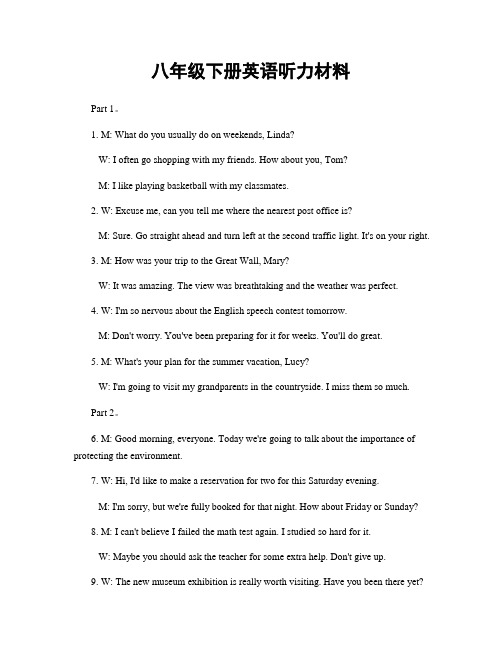八年级下册初中英语加强版听读空间听力
英语全品听读本小册子八年级下册

英语全品听读本小册子八年级下册Title: English Full Listening and Reading Textbook for Grade 8, Volume 2IntroductionThe English Full Listening and Reading Textbook for Grade 8, Volume 2 is designed to help students improve their English language skills through engaging and practical texts. This textbook covers a wide range of topics and themes, providing ample opportunities for students to practice their listening and reading abilities. With a variety of exercises and activities, students can enhance their vocabulary, comprehension, and language proficiency in an interactive and enjoyable manner.Features1. Diverse Texts: The textbook includes a variety of texts such as stories, articles, dialogues, and poems that cater to different interests and preferences of students. This diversity helps keep students engaged and motivated to learn.2. Comprehension Activities: Each text is accompanied by comprehension exercises that test students' understanding of the content. These activities focus on key aspects such as mainideas, details, inference, and vocabulary, allowing students to develop their reading skills effectively.3. Listening Practice: The textbook also features listening exercises that provide students with opportunities to hone their listening skills. The audio recordings correspond to the texts in the book and require students to listen carefully and comprehend the information presented.4. Vocabulary Building: Throughout the textbook, students are introduced to new vocabulary words and phrases that are frequently used in the English language. By encountering these words in context, students can expand their vocabulary and improve their language proficiency.5. Language Activities: In addition to comprehension and listening exercises, the textbook includes language activities that focus on grammar, syntax, and language usage. These activities help students reinforce their knowledge of English grammar rules and improve their writing skills.ConclusionThe English Full Listening and Reading Textbook for Grade 8, Volume 2 is a valuable resource for students looking to enhance their English language skills. With its diverse range of texts,comprehensive exercises, and interactive activities, this textbook offers a well-rounded approach to language learning. By incorporating listening, reading, vocabulary building, and language practice, students can develop their English proficiency effectively and enjoyably.。
初中英语听读空间随身听加强版八年级上册听力材料

初中英语听读空间随身听加强版八年级上册听力材料Unit 1 RobotsPart 1 ListeningSection A1. M: Did you watch the robot competition on TV last night?W: No, I missed it. But I heard that the robot from our city won the first prize.2. W: Have you seen the new robot in the school library? It’s really amazing!M: Yeah, I saw it yesterday. It can speak three languages and answer questions.3. M: Mom, look at this robot. It can clean the floor by itself.W: Oh, that’s great! We should buy one for our house.4. M: I read that scientists have invented a robot that can climb trees.W: That’s cool. Maybe it can help people do dangerous jobs.5. W: I don’t think robots will replace people in the future.M: Why do you say that?W: Because robots don’t have emotions. They can’t feel things like humans do.Section BConversation 1M: Excuse me, could you tell me where the robot competition is being held?W: Sure. It’s being held at City Hall.Conversation 2M: Hi, Kate. Have you ever seen a robot that can walk and talk like a human?W: No, I haven’t. But I’d love to see one.Conversation 3M: Have you heard about the new robot dog in the supermarket? W: No, what does it do?M: Well, it can help people carry heavy bags.Conversation 4M: Why are people so interested in robots?W: Maybe because robots can do things that humans can’t do. Conversation 5W: What do you think robots will do in the future?M: I think robots will help people do everyday things, like cooking and cleaning.Section C1. M: What do you think of the robot competition?W: I think it’s a great way to show people what robots can do.2. M: Will robots replace people in the future?W: I don’t think so. Even if robots can do some jobs, people can do other things that robots can’t do.3. M: Do you think robots can have real feelings?W: No, I don’t. Robots are just machines. They don’t have emotional intelligence.4. M: Can you imagine what life will be like with robots?W: I think robots will make our lives easier and more convenient.5. M: What do you think is the most important function of robots? W: I think robots can help us in situations where it’s dangerous for people to go.。
八年级下册英语听力材料

八年级下册英语听力材料Part 1。
1. M: What do you usually do on weekends, Linda?W: I often go shopping with my friends. How about you, Tom?M: I like playing basketball with my classmates.2. W: Excuse me, can you tell me where the nearest post office is?M: Sure. Go straight ahead and turn left at the second traffic light. It's on your right.3. M: How was your trip to the Great Wall, Mary?W: It was amazing. The view was breathtaking and the weather was perfect.4. W: I'm so nervous about the English speech contest tomorrow.M: Don't worry. You've been preparing for it for weeks. You'll do great.5. M: What's your plan for the summer vacation, Lucy?W: I'm going to visit my grandparents in the countryside. I miss them so much.Part 2。
6. M: Good morning, everyone. Today we're going to talk about the importance of protecting the environment.7. W: Hi, I'd like to make a reservation for two for this Saturday evening.M: I'm sorry, but we're fully booked for that night. How about Friday or Sunday?8. M: I can't believe I failed the math test again. I studied so hard for it.W: Maybe you should ask the teacher for some extra help. Don't give up.9. W: The new museum exhibition is really worth visiting. Have you been there yet?M: No, not yet. I'm planning to go this weekend. I've heard it's quite impressive.10. M: Excuse me, do you know where I can find the nearest ATM?W: Yes, there's a bank just around the corner. You can withdraw money there.Part 3。
译林版八年级下册英语听读训练

译林版八年级下册英语听读训练English:In the "Translation Version" of the eighth-grade textbook, English Listening and Reading Training emphasizes the development of students' listening, speaking, reading, and writing skills. The content covers a wide range of topics, including daily life, environment, school, entertainment, and more, allowing students to learn English in an immersive environment. The exercises include listening comprehension, vocabulary expansion, sentence pattern practice, and reading comprehension. Through these exercises, students can improve their understanding of spoken English and written English, as well as their ability to effectively communicate in English. Additionally, the listening and reading training is designed to help students prepare for language exams and assessments by providing them with ample practice in various language skills and tasks.中文翻译:在《译林版》八年级英语听读训练版本中,强调学生听、说、读、写各项技能的发展。
听读空间听力

听读空间听力
“听读空间听力”指的是一种听力练习或学习资源,旨在帮助学习者提高听力技能。
以下是一些关于如何利用听读空间进行有效听力训练的建议:
1. 选择适合自己水平的材料:根据自己的英语水平和听力目标,选择适合的听力材料。
可以从简单的对话开始,逐渐过渡到较复杂的文章或讲座。
2. 专注聆听:在听读空间中,集中注意力聆听所播放的内容。
尽量减少分心,避免同时做其他事情。
3. 多听多练:持续练习是提高听力的关键。
定期安排时间在听读空间进行听力训练,让自己逐渐适应不同的口音、语速和语境。
4. 注重细节:注意听力材料中的细节信息,如单词的发音、语调、连读等。
这有助于提高对英语语音的敏感度。
5. 做笔记:在听读空间中,可以尝试做笔记,记录关键信息或关键词。
这有助于加深对所听内容的理解和记忆。
6. 对照文本:如果有对应的文本材料,可以在听完后对照文本,检查自己的理解是否准确,并查漏补缺。
7. 扩展听力材料:除了使用听读空间提供的资源,还可以寻找其他听力材料,如英语电影、电视节目、广播等,以丰富听力经验。
8. 与他人交流:与他人分享听力学习的经验和困难,或者参加英语学习社群,与其他学习者互动交流,提高学习的积极性。
通过坚持使用听读空间进行听力训练,并结合以上建议,你可以逐渐提高自己的听力水平,更好地理解和运用英语。
仁爱版英语八年级下册8BUnit6_Topic2_听力基础训练(含答案和听力材料)

仁爱版英语八年级下册8BUnit6_Topic2_听力基础训练(含答案和听力材料)Unit 6 Topic 2 听力基础训练Ⅰ. 听句子,选择正确答语。
每个句子读一遍。
1. A. That’s OK. B. Don’t worry. C. No, thanks.2. A. Yes, I know Helen. B. Yes, this is Helen speaking. C. Yes, I’m here.3. A. No, they’re too busy. B. Yes, they should. C. No, they won’t.4. A. You bet! B. We have no time. C. Oh, you look very happy.5. A. Yes, of course. B. OK, I’d like to. C. You are right.Ⅱ. 听对话,选择正确答案。
每段对话读两遍。
6. Where will Lily live if she goes to Canada for her vacation?A. In Tony’s house.B. In a hotel.C. In Tony’sfriend’shouse.7. Who is looking forward to meeting the teacher?A. Mike.B. Jenny.C. Jim.8. Why does Bill look happy?A. He will go to Dalian.B. He will go to Hangzhou.C. He will go to Nanjing.9. Where will Betty visit?A. She will visit the Ming Tombs.B. She will visit the West Lake.C. She will visit the Great Wall.10. How will David explore the northeast of China?A. By bus.B. By bike.C. By car.Ⅲ. 听两段对话,选择正确答案。
八年级英语下人教版教材听力原文及译文

UNIT 1Section A1b Listen and look at the picture. Then numberthe names [1-5]. Conversation 1Nurse :You don ’t look well. What ’s the matter,Sarah?Sarah :I was playing with my friends atthe park yesterday. Then it got windy, but I didn ’tput on my jacket. Now I have a cold. Conversation 2Nurse :What ’s the matter, David? Are you OK?David :I ate too much junk food at myfriend ’s birthday party. So last night, Igot a stomachache. I almost couldn ’t get myself out of bed this morning.Conversation 3Nurse :What ’s the matter, Ben? Can youmove? Ben :Not really. I was playing soccer the other day and I hurt myself. It seemed OK at first,but now I have a really sore back. Conversation 4听录音并看图。
然后把这些名字按[1~5]的顺序编号。
对话1护士:你看起来气色不好。
怎么了,萨拉?萨拉:昨天我和朋友在公园里玩。
然后刮起了风,但是我没有穿上夹克衫。
现在我感冒了。
对话2 护士:戴维,怎么了?你没事吧?戴维:我在我朋友的生日聚会上吃了太多的垃圾食品。
人教版八年级下册英语第六单元听力材料

人教版八年级下册英语第六单元听力材料The following is the listening material for Unit 6 in the Eighth Grade English textbook of People's Education Press.Part 1: Listening comprehension1. Listen to the conversation and choose the correct answer to each question.A: What did the boy do last weekend?B: He went to the zoo with his family.A: How did he like the zoo?B: He thought it was amazing.2. Listen to the dialogue and fill in the blanks with the missing information.A: What's your favorite animal?B: I like dolphins the most. They are very intelligent and friendly.3. Listen to the dialogue and answer the questions.A: How does the girl usually go to school?B: She walks to school every day.A: How far is it from her home to the school?B: It's about a ten-minute walk.4. Listen to the passage and complete the sentences.The passage talks about the importance of protecting endangered species and the need for everyone to play a part in conservation efforts.Part 2: Listening practice1. Listen to the conversation and repeat each sentence after the speaker.This exercise is meant to help students improve their pronunciation and intonation.2. Listen to a short story and answer the questions based on the information provided.The story is about a boy who saves a lost dog and eventually finds its owner with the help of his friends.3. Listen to a group discussion on environmental issues and write down the main points discussed.The students talk about the impact of pollution on wildlife and suggest ways to protect the environment.4. Listen to a radio program about a wildlife reserve and take notes on the key points mentioned.The program highlights the various species of animals in the reserve and the efforts being made to conserve their habitats.Overall, the listening materials in this unit aim to improve students' listening comprehension skills, vocabulary, and understanding of different accents and speech patterns. It also provides valuable information on environmental conservation and the importance of protecting endangered species. Students are encouraged to actively participate in class discussions and activities related to the topics covered in the unit.。
- 1、下载文档前请自行甄别文档内容的完整性,平台不提供额外的编辑、内容补充、找答案等附加服务。
- 2、"仅部分预览"的文档,不可在线预览部分如存在完整性等问题,可反馈申请退款(可完整预览的文档不适用该条件!)。
- 3、如文档侵犯您的权益,请联系客服反馈,我们会尽快为您处理(人工客服工作时间:9:00-18:30)。
八年级下册初中英语加强版听读空间听力 As a writing expert, I would like to provide you with a sample of an enhanced version of the listening comprehension exercises for the eighth-grade students in the second semester of junior high school English.Listening Comprehension Exercise 1:\nListen to the following conversation and answer the questions.Mandy: Hey, Lisa! Have you heard about the school trip next week?\nLisa: No, what's it about?\nMandy: We're going to visit a local museum and learn about ancient
civilizations.\nLisa: That sounds interesting! When is it?\nMandy: It's on Wednesday. We'll leave school at 8 am and return by 4 pm.\nLisa: Great!
I'll ask my parents for permission.Questions:\n1. What is the school trip about?\n2. When is the school trip?\n3. What time will they leave and return?Listening Comprehension Exercise 2:\nListen to the following passage and complete the sentences.Hello, everyone! Today, I'm going to talk about my favorite hobby - reading. Reading is not only entertaining but also educational. It helps me improve my vocabulary and expand my knowledge. I enjoy reading different genres such as mystery, fantasy, and historical fiction. My favorite author is J.K. Rowling, who wrote the Harry Potter series. Reading allows me to escape into different worlds and experience exciting adventures without leaving my room.1. Reading helps improve ________.\n2. The
speaker enjoys reading different ________.\n3. Who is the speaker's favorite author?Listening Comprehension Exercise 3:\nListen to the following dialogue and answer the questions.Waiter: Good evening! Welcome to our restaurant. How many people are in your party?\nCustomer: There are four of us.\nWaiter: Great! Please follow me to your
table.\nCustomer: Thank you.\nWaiter: Here are your menus. Can I get you something to drink?\nCustomer: Yes, I'll have a glass of water, please.\nWaiter: And for the others?\nCustomer: They'll have iced tea.\nWaiter: Alright. I'll be back to take your order in a moment.Questions:\n1. How many people are in the customer's party?\n2. What does the customer want to drink?\n3. What will the others have?Listening Comprehension Exercise 4:\nListen to the following passage and answer the
questions.Hello, everyone! Today, I want to share with you my experience of learning a new language. Learning a new language can be challenging but rewarding. It opens up opportunities for communication with people from different cultures and helps us understand their perspectives better. To learn a new language effectively, it's important to practice speaking and listening as much as possible. Immersing yourself in the language by watching movies or TV shows and reading books can also be helpful.Questions:\n1. Learning a new language can be ________.\n2. What does learning a
new language open up?\n3. How can one learn a new language effectively?These enhanced listening comprehension exercises aim to provide students with more engaging and challenging content while testing their listening skills effectively.。
